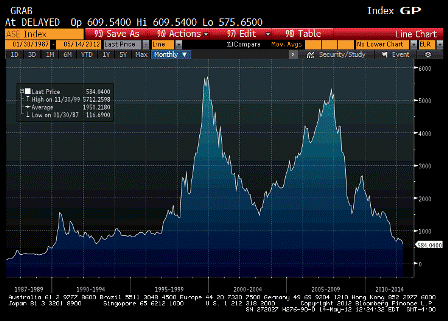US economy muddling through, growing modestly, particularly given the output gap, but growing nonetheless.
Lower crude prices should also help some.
I had guessed the Saudis would hold prices at the $120 Brent level, given their output of just over 10 million bpd showed strong demand
and their capacity to increase to their stated 12.5 million bpd capacity remains suspect. And so with the Seaway pipeline now open (last I heard)
to take crude from Cushing to Brent priced markets I’d guessed WTI would trade up to Brent.
But what has happened is the Saudi oil minister started making noises about lower prices and when ‘market prices’ started selling off the Saudis ‘followed’ by lowering their posted prices, sustaining the myth that they are ‘price takers’ when in reality they are price setters.
So to date, contrary to my prior guess, both wti and brent have sold off quite a bit, and cheaper imported crude is a plus for the US economy. Which is also a plus for the $US, as a lower import bill makes $US ‘harder to get’ for foreigners.
But the trade for quite a while has been strong dollar = weak US stocks due to export pricing/foreign earnings translations, and also because US stocks have weakened on signs of euro zone stress, which has been associated with a weaker euro. So when things seem to be looking up for the euro zone, the euro tends to go up vs the dollar, with US stocks doing better with any sign of ‘improvement’ in the euro zone.
It’s all a tangled case of cross currents, which makes forecasting anything particularly difficult.
Not to mention possible dislocations from the whale, which may or may not have run their course, etc.
And then there’s the news from Greece.
First, they made a full bond payment yesterday of nearly 500 million euro to bond holders who did not accept the PSI discounts. This is confounding for the obvious reasons, signals it sends, moral hazard, credibility, etc. etc. But it’s also a sign the politicians are doing what they think it takes to keep the euro going as the currency of the euro zone. Same goes for the decision to fund Greece as per prior agreements even when there is no Greek govt to talk to, and lots of signs any new govt may not honor the arrangements.
Even if that means tricking private investors out of 100 billion, rewarding those who defy them, whatever. Tactics may be continuously reaching new lows but all for the end of keeping the euro as the single currency.
It also means that while, for example, 10 year Spanish yields may go up or down, the intention is for Spain, one way or another, to fund itself, even if short term. Doesn’t matter.
And more EFSF type discussions. The plan may be to start using those types of funds as needed, keeping the ECB out of it for that much longer, regardless of where longer term bonds happen to trade.
As for the euro zone economy, yes, growth is probably negative, but if they hold off on further fiscal adjustments, the 6%+ deficit they currently are running for the region is probably, at this point, enough to muddle through around the 0 growth neighborhood. The upside isn’t much from there, as with limited private sector credit growth opportunities, and substantial net export growth unlikely, and strong ‘automatic stabilizers’ any growth could be limited by those automatic fiscal stabilizers. Not to mention that this type of optimistic scenario likely strengthens the euro and keeps a lid on net exports as well.
And sad that this ‘bullish scenario’ for the euro zone means their massive output gap doesn’t even begin to close any time soon.
For the US, this bullish scenario has similar limitations, but not quite as severe, so the output gap could start to narrow some and employment as a percentage of the population begin to improve. But only modestly.
The US fiscal cliff is for real, but still far enough away to not be a day to day factor. And it at least does show that fiscal policy does work, at least according to every known forecaster with any credibility, which might open the door to proactive fiscal? Note the increasing chatter about how deficits don’t seem to drive up interest rates? And the increasing chatter about how the US, Japan, UK, etc. aren’t like the euro zone members with regards to interest rates?
Same in the euro zone, where discussion is now common regarding how austerity doesn’t work to grow their economies, with the reason to maintain it now down to the need to restore solvency. This is beginning to mean that if they solved the solvency riddle some other way they might back off on the austerity. And now there is a political imperative to do just that, so things could move in that direction, meaning ECB support for member nation funding, directly or indirectly, which removes the ‘ponzi’ aspect.

